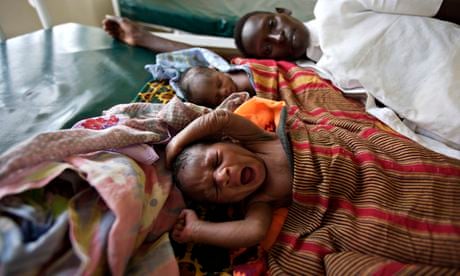The trial of a new drug to prevent excessive bleeding in women after childbirth, which could potentially save thousands of lives annually, is to begin in 12 countries in June.
The clinical study, which will be conducted by the World Health Organisation (WHO), will include about 29,000 women in Argentina, Brazil, Egypt, India, Kenya, Nigeria, Pakistan, Singapore, South Africa, Thailand, the UK and Uganda. The trial, which is expected to last 18 months, will test the effectiveness of a new medicine developed by Ferring Pharmaceuticals, which can be stored at room temperature in hot and tropical locations.
Oxytocin, the drug most commonly used to prevent bleeding after childbirth, requires refrigeration, which is a major obstacle for health centres in countries with unreliable energy supplies. The problem is particularly acute in poorer countries, which may lack not only cold storage facilities but also decent roads, making journeys to more remote areas significantly slower, particularly during rainy seasons.
According to the WHO, postpartum haemorrhage is the leading cause of death during childbirth, killing about 130,000 women worldwide each year.
The millennium development goal of a 75% reduction in maternal deaths by 2015 is among the most off-track of the eight global targets, and is unlikely to be met in the majority of poorer countries. However, all regions have made gains in cutting rates. According to the UN, the ratio of maternal deaths per 100,000 live births fell from 400 to 210 between 1990 and 2010.
If the WHO trial is successful, the agency will collaborate with Ferring and the pharmaceutical company Merck to explore how to make the medicine cheaply available to poorer countries.
Michel Pettigrew, president of Ferring's executive board, said he wanted the drug to be as cheap as possible. A vial of oxytocin costs about £1; Pettigrew hoped the new formula would not cost much more.
"For many years, one of the concerns expressed to us by our medical committee was how we don't have a climate-sensitive product, which would be easier to keep. So we started looking into this two and a half years ago, and were able to develop a formulation which would be acceptable for these temperatures," he said.
"We thought, let's make sure we try to make a product at a very low cost to make it available at a very low price to low-resource countries. That way, at least we've done our part to help women get through pregnancy and live a normal life afterwards with their children.
"We believe we have developed a drug which can save lives. We are not a big pharmaceutical company, we're privately owned, so the financial motivation [for us] is very different. The commitment from shareholders is [that] we should help people around the world."
Kenneth Frazier, chairman and chief executive at Merck, said: "Working with our partners, we can help make a better solution a reality. It would be a real breakthrough to prevent the number one cause of women dying in childbirth in the most vulnerable parts of the globe." Through its Merck for Mothers initiative, the company has committed $500m (£300m) over 10 years to find ways to reduce maternal mortality.










